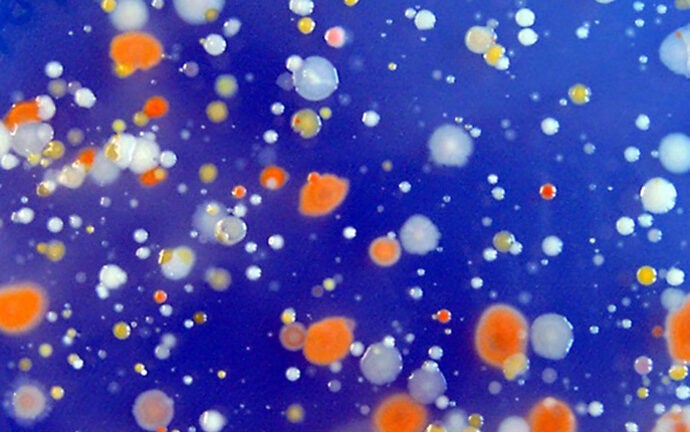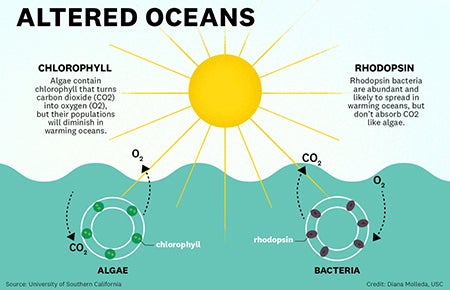
A surprisingly abundant type of marine bacteria may speed up climate change
Scientists have found that marine microbes with a special metabolism could play an important role in how Earth regulates climate.
The study, led by researchers at USC Dornsife College of Letters, Arts and Sciences, finds marine bacteria containing rhodopsins, a sunshine-grabbing pigment, are more abundant than once thought. Unlike algae, they don’t pull carbon dioxide out of the air. And, they will likely become more abundant in warming oceans, signaling a shuffling of microbial communities at the base of the food chain where the nitty-gritty work of energy conversion occurs.
“Oceans are important for climate change because they play a key role in the carbon cycle. Understanding how that works, and the marine organisms involved, helps us refine our climate models to predict climate in the future,” said Laura Gómez-Consarnau, assistant professor (research) of biology at USC Dornsife.
The study appeared Aug. 7 in Science Advances. Gómez-Consarnau is the lead author among an international team of scientists from California, China, the United Kingdom and Spain.
Rhodopsins could impact global warming
The findings break from the traditional interpretation of marine ecology found in textbooks, which states that nearly all sunlight in the ocean is captured by chlorophyll in algae. Instead, rhodopsin-equipped bacteria function like hybrid cars, powered by organic matter when available — as most bacteria are — and by sunlight when nutrients are scarce.
In this study, researchers trolled a 3,000-mile-long swath of the eastern Atlantic Ocean and Mediterranean Sea in 2014. They sampled microorganisms down to 200 meters to find how widespread rhodopsins are and in what conditions they are favored.
They found that rhodopsin photosystems were much more abundant than previously realized and concentrated in nutrient-poor waters. Here, they outperform algae at capturing light.

“… In the future, the ocean will be more nutrient-poor as temperatures change. With fewer nutrients near the surface, algae will have limited photosynthesis and the rhodopsin process will be more abundant,” Gómez-Consarnau said. “We may have a shift in the future, which means the ocean won’t be able to absorb as much carbon as it does today. More CO2 gas may remain in the atmosphere, and the planet may warm faster.”
To fully evaluate how the findings affect the ocean’s capacity to absorb greenhouse gases, Gómez-Consarnau said CO2 fluxes in marine systems will need to be reevaluated and future climate models will have to account for the role of rhodopsin-based metabolism.
Visit USC News for more of the story >>
Study details
Other USC Dornsife authors on the study include scientists Sergio A. Sañudo-Wilhelmy, Naomi M. Levine, Jed A. Fuhrman and Lynda S. Cutter. Additional authors are John A. Raven of the University of Dundee in Scotland; Deli Wang of the State Key Laboratory of Marine Environmental Science, Xiamen in China; Brian Seegers of the Scripps Research Institute in California; Javier Arístegui of the Universidad de Las Palmas de Gran Canaria in Spain; and Josep M. Gasol of the Institut de Ciències del Mar-CMIMA (CSIC) in Spain.
Research was funded by the Marie Curie Actions-International Outgoing Fellowships (#253970); a U.S. National Science Foundation grant (#OCE1335269); the Simons Foundation (#50972); the Gordon and Betty Moore Foundation Marine Microbiology Initiative (#3779); Project MAR in Spain (#CTM2011-30010-C02-MAR); and the University of Dundee as a registered Scottish charity (#SC015096).